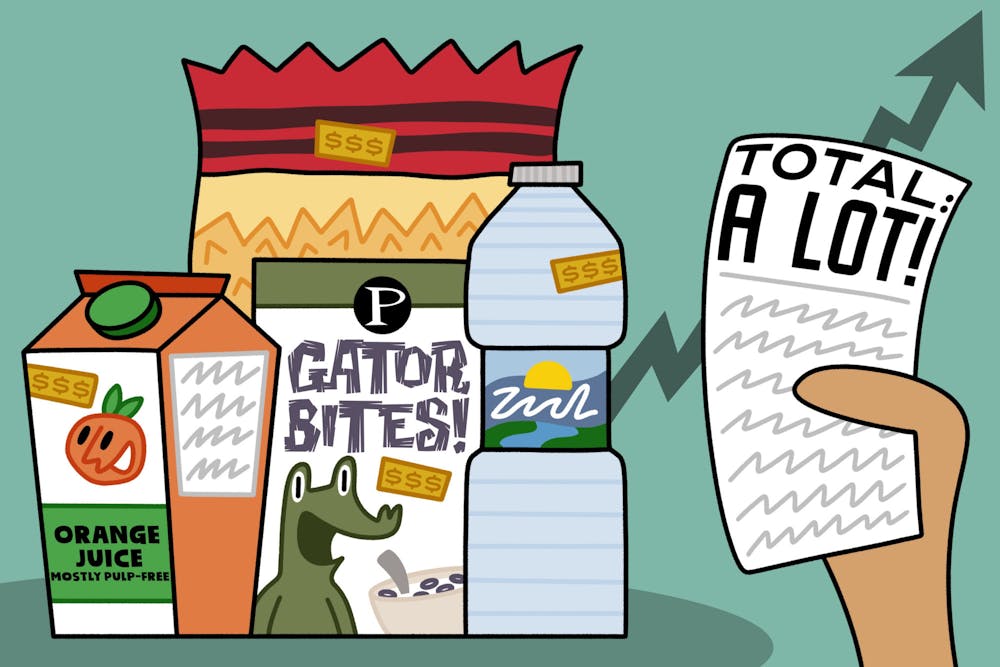Not even the celebrated Gatorade sports drink, a product of Gainesville, is immune to inflation.
Paying an extra dollar or two for a pack of Glacier Freeze is merely inconvenient for some, but price hikes are becoming more burdensome for others. Beyond the supermarket, steady cost increases on essentials signal choppy waters ahead for consumers nationwide, including those in Alachua County.
For Tamara Torres, a Gainesville resident in her 50s, the cost of living in Alachua has become nearly untenable. Torres, a single mother, works at the Wawa convenience store on West University Avenue and makes barely enough to scrape by, she said.
Alachua County's cost of living is currently 4% higher than the national average, and homeowner’s insurance rates increased by more than 40% in the past year.
While prices are starting to cool, millions of Americans still feel the pinch of high essential costs. Many may echo Torres’ frustration as they rein in their discretionary spending to provide the necessities for their families.
On a tight grocery budget of $150 a week, Torres laments she and her two sons “don’t get everything [they] want.”
Data from the 2020 U.S. Census ranks Florida as the fifth most expensive state, behind California, Nevada, Mississippi and Washington. As hordes of Californians and New Yorkers flock to the Sunshine State, longtime Florida residents like Torres consider moving elsewhere in search of more affordable living.
“I’ve been trying to get out of Florida for years,” she said. “[The state] is horrible when it comes to help.”
Torres said receiving financial assistance from the state is cumbersome, citing the unwieldy process of filing an official request for help. Plus, Florida imposes strict constraints on state beneficiaries. Households must make little to no income to meet the requirements, and qualified recipients are only eligible to receive four years of aid. Simply put, those who earn enough to get by are unlikely to obtain the extra help necessary to get ahead.
Torres feels her back is against the wall without sufficient aid to lighten the load. For now, she and her two sons live in a hotel room, and they hope to settle into something more stable once costs aren’t so high.
“It’s very difficult,” Torres said. “It’s $500 a week that we have to pay [for accommodations], and thank God, it’s the three of us.”
The high living costs also pose concerns to younger residents of Alachua County, including university students who might consider making Gainesville their home after graduation.
Jacob Yancey, a 27-year-old Gainesville resident, lived on and off in the city from ages 8 to 18. After completing an advanced degree program in Nashville, Tennessee, he returned to Alachua County, planning to put down roots and establish his career as a mental health counselor. Still, he remains uncertain about the future and worries that current students who want to settle in the city post-graduation will not have the means.
“The rent here is crazy … for a lot of young people, especially young grads,” he said. “It’s going to be really difficult for them to afford housing.”
As of 2024, the median house price in Gainesville is $295,500, up 2.6% from 2023. For comparison, Tallahassee’s homes cost 11% less, and rent is 23% lower, too. Yet the difference in cost of living between the two cities remains almost negligible: about 1% lower in Tallahassee.
Florida is also bracing for an aggressive hurricane season, and home insurance premiums will reflect the risks.
Yancey, who has roommates, said he’s sure the cost of their disaster coverage plan will increase substantially as the state prepares for an onslaught of heavy wind and rain. Aggressive hurricanes and corresponding insurance hikes are “pretty par for the course for Florida,” Yancey said.
While many Alachua County residents won’t have to worry about home insurance, they must contend with soaring rents. Most students, like Lucy Craft, a 20-year-old Santa Fe College graphic design junior, live in dorms or apartments. Craft said she feels trapped in an unideal living situation.
“I have to actually budget now, and we had to move into a place that I didn’t want to move into because of the cost,” she said.
After living in Gainesville for two years, Craft said she does not foresee being able to afford a home or enjoy significant upward mobility. If she were to buy something permanent, she anticipates it would be a trailer on a plot of land.
Like Yancey, Craft said she spends more than she’d like on groceries — approximately $150 per week, as much as Tamara Torres does to feed three people.
G’orgeous Grandison, a UF criminology sophomore, said she spends between $50 and $100 weekly at the grocery store and knows two-person households that pay nearly four times as much.
The 19-year-old predicts the cost of living in Gainesville will become less affordable over the next five years. And she doubts young people will be able to afford to own Gainesville homes anytime soon.
“No,” she said. “Especially if you live close to the university.”
Contact Natalie Kaufman at nkaufman@alligator.org. Follow her on X @Nat_Kauf.
Natalie Kaufman is the business enterprise reporter and a second-year journalism major. Outside the newsroom, you'll catch her drinking too much caffeine and running.






